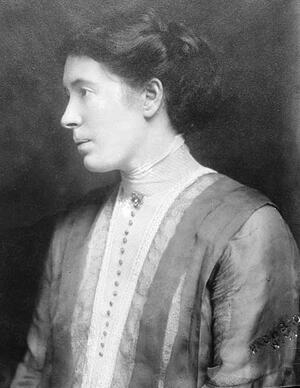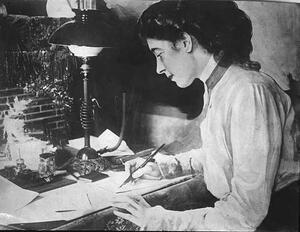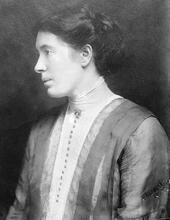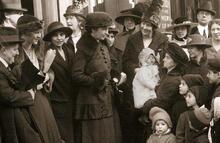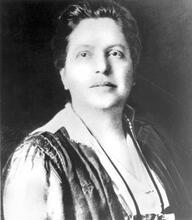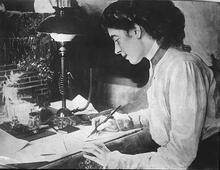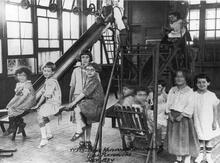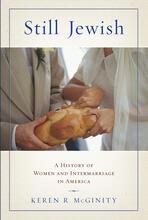Rose Pastor Stokes
Called the “Cinderella of the sweatshops,” Rose Pastor Stokes made headlines when she married millionaire socialist James Graham Phelps Stokes. Stokes started work in a sweatshop at age eleven. In 1901, she became a columnist for a Yiddish paper. Through her work, she met her husband, whom she married amidst a media storm. Stokes became a prominent speaker for the Socialist Party and a union organizer and lobbied and wrote plays in support of birth control. Stokes used her position to her advantage, with her working-class background giving her credibility while her upper-class marriage protected her from arrest. In 1918, however, she was arrested for anti-war activism. Her marriage later ended in divorce and she supported herself with her writing.
Early Life and Work
Born Rose Harriet Wieslander in Augustova, Poland, on July 18, 1879, she was the first child of a loveless marriage. At age three, she moved to England with her mother, leaving her father (whom she knew only as “Jacob the Learned Bootmaker”) and the pogrom-threatened (Yiddish) Small-town Jewish community in Eastern Europe.shtetl behind. Living with relatives in the squalid slums of London’s East End, Rose was compelled by necessity to leave school at age eight and join the workforce. In England Rose’s mother, Hindl, married Israel Pastor, who soon decided to resettle the family in America. In 1890, Hindl, Rose, and the new baby Maurice joined Pastor in Cleveland, where Rose found work in a “buck-eye,” the cigar-sweatshop in which many Jews labored. She worked as an unskilled “stogey-roller” for twelve years. After Israel Pastor abandoned the family, she became the sole supporter of six. For those who later popularized her character in the media, this period of her life often faded to an idealized working-class experience, but for Rose herself, it stood out as formative for her identity.
Her love of reading impelled her to respond to a call for letters in the Yidishes Tageblat [Jewish daily news]. In 1901, her first letter was published on the Tageblat’s English page, and she soon became a regular contributor. Her column gained such popularity that the editor offered her a full-time position as a resident columnist in New York City for the enticing salary of $15 per week. She settled on the Lower East Side in January 1903, joined within a few months by her mother and some of her siblings.
Her work at the Tageblat provided her with a forum to explore political themes and brought her into contact with ghetto intelligentsia. It was also through the Tageblat that she met her future husband. As part of a series on settlement workers, Rose interviewed James Graham Phelps Stokes, a reform-minded millionaire from a prominent family. After the publication of this interview, Pastor and Stokes became fast friends. Their relationship took a more intimate turn at the end of the summer of 1904, and they began to discuss marriage.
Marriage
The news of this unlikely engagement broke on the front page of the New York Times on April 6, 1905, with a headline reading “J. G. Phelps Stokes to Wed Young Jewess—Engagement of Member of Old New York Family Announced—Both Worked on East Side.” The article sensationalized the romantic story and the sharp contrasts in background between the two, calling her the “Cinderella of the sweatshops.”
Although the great disparity in class background between Pastor and Stokes was to become the central—and divisive—issue in the course of their marriage as well as in historical hindsight, the issue of religion provoked the most concern at the time of their engagement. The class distinction between them, however, constituted material for romantic fantasy. A love that overcame social barriers appealed to the public as a living fairy tale, as well as an example of the classic American success story.
From the first time that Stokes and Pastor discussed marriage, they determined to remain in the world of the Lower East Side, yet she joined his world of philanthropic reformism. Both quickly became disillusioned with settlement work, however, and in 1906, they joined the Socialist Party of America. She became one of the most prominent speakers on the Intercollegiate Socialist Society tour.
Labor Activism and Feminism
Stokes defined her new role as the voice of the worker, with the responsibility to use her newfound influence to help the working class. Although she stated, “I believe ... that the Jewish people, because of the ancient and historic struggle for social and economic justice, should be fitted to recognize a special mission in the cause of the modern Socialist movement,” she resisted ethnic specificity and association with Jewish organizations, defining allegiance only along class lines.
After devoting herself to the lecture circuit for ten years, Stokes applied her political energy to labor activism and to organizations outside the formal structure of the Socialist Party. She led the movement in support of Patrick Quinlan, a strike leader of the radical Industrial Workers of the World. In New York in 1912, she spearheaded a campaign to organize chambermaids into a branch of the International Hotel Workers’ Union and to encourage them to strike. Stokes also garnered a great deal of attention for her birth control activism, serving as a leader of the groups that agitated in support of Margaret Sanger during the time of her arrest and trial, and writing two pro–birth control plays, The Woman Who Wouldn’t and Shall the Parents Decide (cowritten with Alice Blache). Stokes became involved in the cause of birth control because it provided a means of doing direct, concrete work for the benefit of the working class. Her distinctive position made her particularly successful in this cause, for her working-class background gave her argument a personal legitimacy, while her upper-class position protected her from arrest.
Antiwar Activism and Trial
Public attention to Stokes reached its peak over her antiwar activism, culminating in her arrest on March 22, 1918, for an antiwar speech in Kansas City, Missouri, and a letter to the local paper in which she declared, “No government which is for the profiteers can also be for the people, and I am for the people, while the government is for the profiteers.” Stokes’s conviction was appealed twice before the decision was reversed in March 1920, on the grounds that the charge to the jury was prejudicial against the defendant.
The arrest and trial of Stokes attracted a great deal of notoriety and only exacerbated the tension within her marriage, which ended in divorce in 1926. Stokes had moved toward a radicalism increasingly incompatible with her husband’s position as a millionaire socialist. She was present at the 1919 socialist convention in Chicago, at which the Communist Party of America was founded, and she held a position on the CP Central Executive Committee. As an American delegate to the Comintern’s Fourth World Congress in Moscow in 1922, Stokes submitted a minority report on the “Negro question.” Although she had been wary of separate organizations for women during her involvement in the Socialist Party, she began to advocate a special organization for women in the Communist Party and took on the job of managing the Women’s Work Department of the Central Executive Committee.
Later Life
While she remained devoted to radical activism, the last ten years of Stokes’s life were filled with emotional and financial strain. Making no financial demands on her ex-husband except for a monthly stipend for her mother, Stokes depended on her writing as her primary source of income. She remarried in 1927, to Jerome Isaac Romain (who later changed his name to Victor J. Jerome), a Russian-Polish Jew active in the Communist Party. Due to their financial needs, Romain lived and worked in New York, while Stokes remained at her house in Westport, Connecticut, taking care of Romain’s young son and continuing her political activism.
In 1930, Stokes was diagnosed with a malignant breast tumor, which she attributed to having received a blow on the breast from a policeman’s club during a demonstration—claiming martyrdom for the proletarian cause. Her health rapidly declined; even so, she maintained her radical, fighting spirit. Although her illness prevented her from remaining active in the Communist Party during the last years of her life, she continued to assert her allegiance to it. On June 20, 1933, she died in Germany, where she had sought medical care at an experimental clinic.
Legacy
Stokes’s complicated identity continued to confound historians, writers, and thinkers after her death. Some have located her importance in her sensational marriage, emphasizing her connection to the Phelps-Stokes family over and above her political significance and activism. In contrast, the Communist Party, as the custodian of her memory after her death, sought to construct from her character and experiences a model for the party that fit neatly—more neatly than Stokes did herself during her lifetime—into party ideology.
Stokes used her autobiography, which she began in 1924, as a forum to negotiate these tensions in her identity, rewriting her own background and balancing the visions that others had of her life and mission. When she became too ill to continue writing, she entrusted the project of its completion to Samuel Ornitz, a communist writer, friend, and later member of the blacklisted Hollywood Ten, who finally abandoned it in 1937. In her autobiography as in her life, Stokes fused American values of self-improvement with immigrant and socialist ideals of community.
Selected Works by Rosa Pastor Stokes
“I Belong to the Working Class”: The Unfinished Autobiography of Rose Pastor Stokes. Edited by Herbert Shapiro and David L. Sterling (1992)
Shall the Parents Decide (1916), with Alice Blache
The Woman Who Wouldn’t (1916).
AJYB 24:207, 35:129.
DAB.
EJ.
NAW.
“Rose Stokes Dies After Operation.” The New York Times, June 21, 1933.

